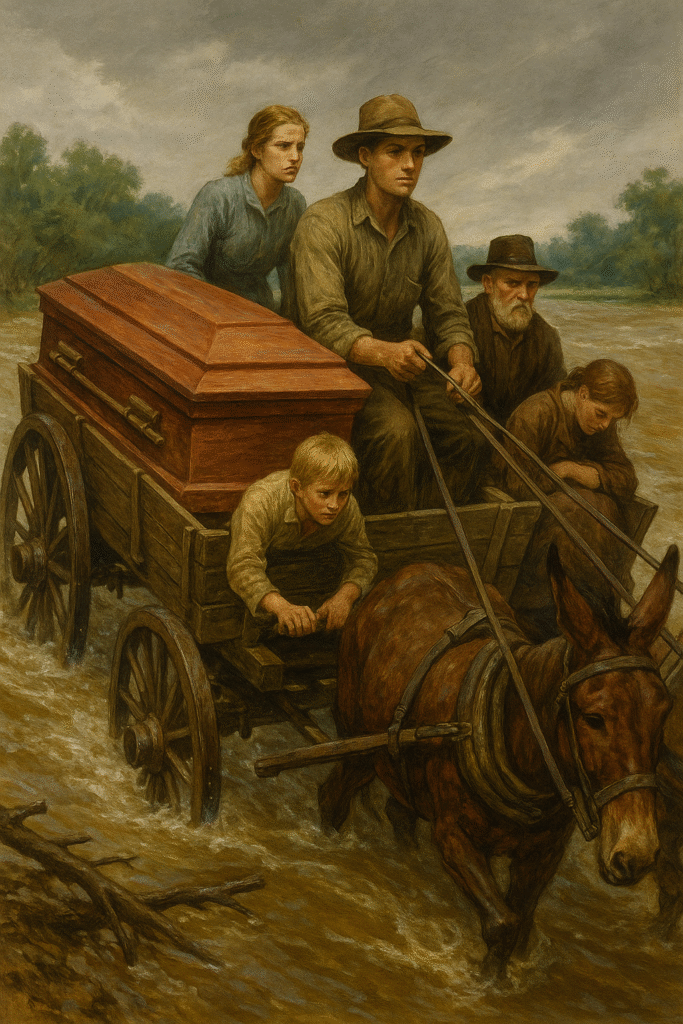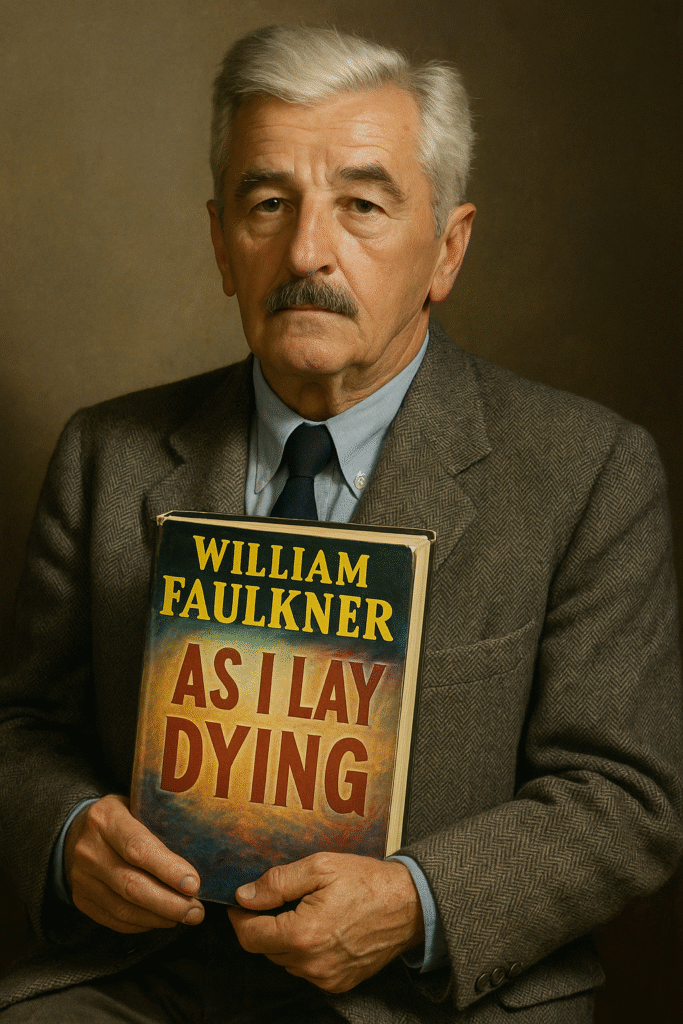By ABS, The Literary Scholar
(Who firmly believes that if your family road trip doesn’t involve a flood, a fire, and a decomposing matriarch, you haven’t truly earned your Faulkner)
Welcome to the most dysfunctional funeral procession in American literature.
William Faulkner’s As I Lay Dying (1930) is the kind of novel you read, then reread, then Google to confirm that yes—that actually happened, and no, there’s no one in this family you’d want to have dinner with.
It’s Southern Gothic at its messiest. A tale of one dead woman, her coffin, and the series of poor decisions made by her family to honor her final wish: “Bury me in Jefferson.”
A simple request, really.
Until you realize they’re dragging a corpse across Mississippi in a wagon, through floods, fires, and furies—with nothing but bad decisions and internal monologues to guide them.
Addie Bundren: The Corpse Who Speaks (Eventually)
Let’s start with the guest of honor. Addie Bundren is dead. But that doesn’t stop her from narrating a chapter halfway through the novel—because Faulkner doesn’t believe in limitations like chronology, grammar, or corpse etiquette.
Addie, a former schoolteacher turned mother-of-many, is bitter, philosophical, and quite frankly done with all of them—even from beyond the grave.
“The reason for living was to get ready to stay dead a long time.”
Romantic, isn’t it?
The Bundren Family: A Dysfunctional Symphony in 15 Voices
The narrative voice? Plural. Very plural.
Faulkner gives us 15 narrators, each with a fragment of the truth and a surplus of psychological baggage. It’s like being stuck on a family WhatsApp group during an existential tornado.
Let’s meet the key players:
Anse Bundren – The father. Possibly made of sawdust and self-pity.
Thinks owning a set of false teeth is a personality. His greatest ambition? Getting those teeth.
“I have heard men cuss their luck, and right, for they are sinful. But I do not deserve to be cursed like this.”
Translation: Why is burying my wife so inconvenient for me?
Cash Bundren – The carpenter son. Builds Addie’s coffin while she’s still breathing.
Talks in bullet points. Literally. His narration includes a numbered list.
“It won’t balance. If you want it to tote and ride on a balance, we must have…”
This man measures grief with a leveler.
Darl Bundren – The sensitive, poetic, possibly psychic son.
Narrates most of the book. Slips into third-person mid-thought. Also, ends up institutionalized. Coincidence?
“I don’t know what I am. I don’t know if I am or not.”
Faulkner: Let’s give anxiety a narrative arc.
Jewel Bundren – The angry, horse-loving son with a storm for a soul.
Probably born from Addie’s rage and a stray lightning bolt.
“He is my cross and he will crucify me.” – Addie (about Jewel).
So, just your typical mother-son dynamic.
Dewey Dell Bundren – The only daughter. Pregnant. Panicked. Powerless.
Wants medicine. Gets mansplained. Represents every woman who’s ever been dismissed by a pharmacist and a patriarch.
Vardaman Bundren – The youngest. Utterly confused.
Famously declares:
“My mother is a fish.”
And honestly? Same, Vardaman. Same.
Plot? What Plot?
The plot is deceptively simple:
Get Addie to Jefferson.
But Faulkner turns this into a parade of surreal disasters:
The coffin nearly floats away in a flood.
The family’s mules drown.
The body begins to rot (yes, we’re told).
There’s a barn fire, possibly arson.
Dewey Dell gets manipulated by a drugstore creep.
Darl gets committed.
And Anse—oh, Anse—remarries before the dust settles on Addie’s casket.
It’s not a novel. It’s Southern tragedy meets dark slapstick—with teeth. Literally. Anse gets them.
Structure: Stream of Consciousness, Straight into the Swamp
Faulkner’s prose doesn’t walk. It stumbles, sways, and occasionally screams into the void.
Sentences stretch like southern summers. Paragraphs refuse punctuation. Thoughts interrupt themselves.
“I feel fine. I am fine. The barn. The barn is on fire. My head is made of teeth.”
Okay, I made that last one up. But it feels real, doesn’t it?
Themes: Death, Identity, Isolation, and Other Family Traditions
At its dark, glorious core, As I Lay Dying is about the unbearable weight of being known—or worse, being misunderstood by the people who share your roof and your last name.
Each character is drowning in their own quietly catastrophic loneliness. They grieve differently. They lie differently. They survive differently.
Faulkner doesn’t give us healing. He gives us a shovel, a storm, and a stare.
Why Read It (Despite the Trauma)?
Because Faulkner dares to make tragedy funny and insanity poetic.
Because it shows you that even when the plot dies, the prose can still carry the casket.
Because every sentence is half a prayer, half a cry for help.
And because buried beneath the dirt and dysfunction is a message:
Love is messy. Death is worse. But narrative—oh, narrative—is the only thing that keeps the coffin from floating away.
And somewhere, ABS, The Literary Scholar, lights a match near the barn door, watches the shadows stretch across a crooked coffin, and mutters, “Sometimes the family that buries together, breaks apart together.”

Signed,
ABS
The Literary Scholar
(Still listing reasons why this novel isn’t actually a how-to guide)
(Still wondering what kind of man uses his wife’s funeral to buy new teeth)
(And who knows that Faulkner didn’t just write the South—he stitched it into madness, memory, and metaphor)

Share this post / Spread the witty word / Let the echo wander / Bookmark the brilliance
